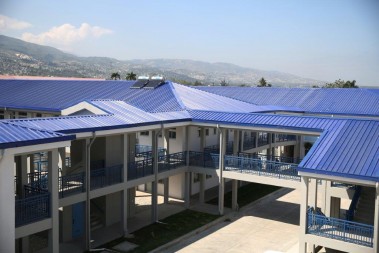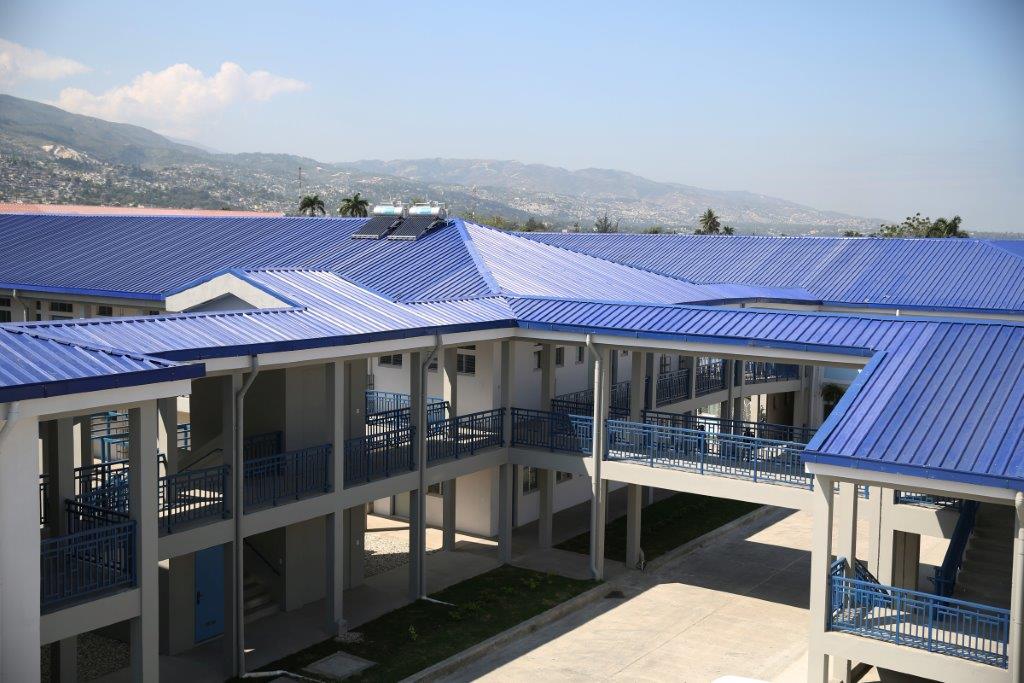January 20, 2016 // Uncategorized
Living as the Body of Christ

St. Francois de Sales Hospital celebrated its reopening at its original site in the heart of downtown Port-au-Prince in 2015, five years after the devastating earthquake. Bishop Kevin C. Rhoades will be visiting the hospital during his visit to Haiti this week. The rebuilding has transformed one of the country’s oldest Catholic hospitals into a modern teaching facility that will train medical professionals and serve as a model for providing quality care to the poor around the country. “The new St. Francois de Sales Hospital is more than a first-rate medical facility,” said Carolyn Woo, president and chief executive officer of Catholic Relief Services (CRS), which was instrumental in the rebuilding. “It will also be an important part of the future of medicine in Haiti through its training mission even as it provides the quality healthcare the poor of this country need and deserve.”
One of my favorite images or metaphors of the Church is that of the Church as the Body of Christ. Saint Paul has given us this image. He writes about the Church as the Body of Christ in his first letter to the Corinthians, particularly in chapter 12, which we will hear in the second reading at Mass this coming Sunday. The reading begins:
As a body is one though it has many parts, and all the parts of the body, though many, are one body, so also Christ. For in one Spirit we were all baptized into one body, whether Jews or Greeks, slaves or free persons, and we were all given to drink of one Spirit.
This is a new image that Saint Paul uses. It is not found in the Old Testament. Paul is highlighting the unity of the Church within the multiplicity of members. As he writes also to the Romans: We, though many, are one body in Christ (12:5).
We are the members of the Body of Christ. We are united among ourselves in virtue of our union with Christ, who is the head of the body. Our unity as members of the Church, our unity with one another, comes from Christ. We are brothers and sisters of different races, languages, and ethnicities, yet we are one because we have drunk, as Saint Paul says, of one Spirit. As head, Christ has filled the body with His divine life. He is the principle and source of our communion in love.
It is important to remember these profound truths when there are disagreements or divisions in the Church, whether in parishes or other communities. We must always turn to Christ our head, the source of our unity. There were divisions and factions within the Christian community of Corinth. I imagine that is why Saint Paul came up with the image of the Church as the body of Christ, to teach the divided Christians to forsake their cliques. He called them to unity as one body in Christ.
In our parishes and in our diocese, we must always be conscious of our unity as brothers and sisters in Christ and our unity in faith and mission. We must also be conscious of our unity within the universal Church. This week, I will be in Haiti with Catholic Relief Services as a member of the governing board of CRS. I look forward to visiting with our brothers and sisters who suffer extreme poverty in that poorest country of the Western hemisphere. The Church in Haiti and the Church in the United States are part of the one Body of Christ.
I will always remember that the first decision I made as Bishop of Fort Wayne-South Bend was to take up the collection for the victims of the terrible earthquake in Haiti six years ago. It occurred on January 12, 2010, the day before I was installed as bishop here. It was a devastating disaster in which over 100,000 people were killed and over 1 million people left homeless. The country was in ruins. One of the purposes of our visit to Haiti this week is to see the many works of CRS in rebuilding homes and communities there.
Back to the special collection in January 2010: I remember how edified I was to see the generosity of the people of my new diocese, your generosity — over ½ million dollars was collected here in our diocese that weekend to support the humanitarian work of CRS in the aftermath of the earthquake. This reminds me of the words of Saint Paul concerning the Church as the body of Christ: If one part suffers, all the parts suffer with it; if one part is honored, all the parts share its joy. I think today of the suffering Church in the Middle East. The persecuted Christians of Iraq and Syria, many of whom are refugees, are our brothers and sisters in Christ. Their suffering must be our suffering. We are called to compassion for them, to pray for these suffering members of the Body of Christ and to assist them, as we are also doing through the work of Catholic Relief Services.
The Church is a living organism like the human body with various parts that carry out various functions. All are necessary. We have bishops, priests, deacons, religious, and laity. Together we are the Body of Christ with all our different gifts and charisms.
Pope Pius XII used the phrase “Mystical Body of Christ”, a beautiful expression that emphasizes the spiritual life of the Church. What keeps and holds us together? The Holy Spirit! The Second Vatican Council taught: By communicating His Spirit, Christ made His brothers and sisters, called together from all nations, mystically the components of His own body (Lumen Gentium 7). We are held together by the Holy Spirit poured out upon us by Christ our Head. The Spirit builds us up in love.
My episcopal motto Truth in Charity comes from Saint Paul’s letter to the Ephesians and is related to this theme of the Church as the Body of Christ. Saint Paul exhorts us to live the truth in love. He writes: Living the truth in love, we should grow in every way into Him who is the head, Christ (Eph 4:15). This is a question to ask ourselves often: are we living the truth in love? Do we practice what we teach? Are we growing into the full stature of Christ?
When we reflect on this concept of the Church as the Body of Christ, we also recognize with Saint Paul the close connection of this idea with the Eucharist. The Church really becomes the Body of Christ in the Eucharist where we receive His Body and become His Body. We receive the true Body of Christ in a sacramental way in the Eucharist under the appearance of bread. Doing so, we are spiritually united to our head and to all the members of the Body. Thus we become one Body in Christ. This is why we can say that the Eucharist makes or builds the Church. Saint Thomas Aquinas taught that the Eucharist is the sacrament of the unity of the Church. It is the apex of the Church’s life.
With these reflections, I invite you to think more deeply about the Church’s identity as more than a social group or organization. It is the Body of Christ. May the Lord help us to be His Body, the place where His love is manifest in the world!
The best news. Delivered to your inbox.
Subscribe to our mailing list today.






